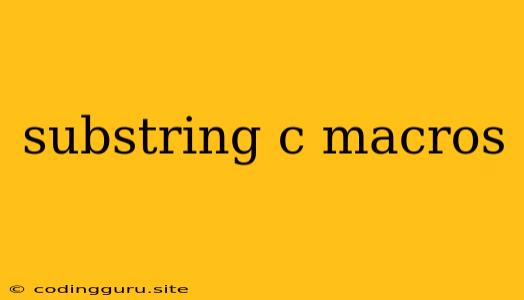Delving into Substrings and Macros in C
C, a powerful and versatile programming language, often requires manipulating strings. Extracting a specific portion of a string, known as a substring, is a common task. While C doesn't natively offer a dedicated substring function, we can achieve this functionality using macros. This article will guide you through the world of substring manipulation in C using macros.
Why Macros for Substrings?
Before diving into the code, let's understand why macros are often preferred for substring operations in C.
-
Efficiency: Macros are expanded by the preprocessor, resulting in inline code. This eliminates function call overhead, making your code run faster.
-
Conciseness: Macros allow you to encapsulate complex logic within a single line of code, simplifying your code and making it more readable.
-
Flexibility: Macros can be customized to fit specific needs, allowing you to define substring operations with varying arguments and behavior.
Crafting a Substring Macro
Let's craft a simple macro to extract a substring from a given string:
#define SUBSTRING(str, start, len) (str + start)
This macro takes three arguments:
str: The original string.start: The starting index of the substring within the original string.len: The length of the desired substring.
The macro returns a pointer to the starting position of the substring within the original string.
Example: Substring Extraction
Let's see this macro in action:
#include
#define SUBSTRING(str, start, len) (str + start)
int main() {
char str[] = "Hello, World!";
char *substring = SUBSTRING(str, 7, 5); // Extract "World"
printf("Original string: %s\n", str);
printf("Substring: %s\n", substring);
return 0;
}
In this example, the macro extracts "World" from the original string by specifying start = 7 and len = 5. The output will be:
Original string: Hello, World!
Substring: World
Caveats of Using Macros
While macros offer efficiency and conciseness, it's crucial to be aware of potential pitfalls:
-
Type Safety: Macros don't perform type checking. This can lead to unexpected behavior if the arguments are not of the expected type.
-
Side Effects: If the macro contains expressions with side effects, these effects might occur multiple times, causing unexpected behavior.
-
Debugging: Debugging code containing macros can be challenging due to the preprocessor's expansion.
Alternatives to Macros
For more complex substring operations, consider using standard C library functions like strncpy and strtok. These functions offer greater type safety and debugging capabilities, but they might introduce performance overhead due to function calls.
Summary: Harnessing the Power of Substrings and Macros
Macros provide a powerful tool for efficient substring manipulation in C. They offer concise syntax, improved performance, and customization options. However, be mindful of their limitations, particularly regarding type safety and debugging. Weigh the pros and cons of using macros against other alternatives like standard library functions to find the best solution for your specific coding needs.
